Back in mid-April, I wrote a post about the pandemic that drew a bit of attention. In it I expressed a good deal of anger. Anger at claims that the virus was not as bad as some were making it out to be. Anger at people who were calling dire projections of high fatalities a “hoax” because the CDC had lowered some of its worst-case estimates. And anger at government leaders who were calling for an early re-opening of the economy because, really, how bad could the virus be compared to a steep recession.
If you think I was pissed off then, how angry do you think I am now?
Let’s start with those fatality projections. Here is what I wrote in that April post:
“How many of you have heard people claiming that, because the national death toll is now projected to be lower – ‘merely’ 64,000 rather than 100,000-240,000 – the more alarmist projections were a ‘hoax’ and symptomatic of panic and overreaction?”
First of all, how quaint that experts were projecting a death toll of 64,000 in April. We’re beyond twice that number now, and deaths in the U.S. are rising again. We’re over 135,000, heading toward God-knows-what. When I wrote that piece, the U.S. had 682,000 Covid-19 cases (we’re over 3.2 million now) and 23,000 deaths. And we thought things were terrible. It was a crisis. We took solace in that 64,000 death projection, horrible though it was.
As I said at the time, those who were shouting, “Hoax!” because the projections had gone down, ignored the reason those estimates fell: namely that the country had adopted safety measures recommended by health experts. We were washing our hands, starting to wear masks, distancing ourselves from the people around us. And we cut way, way back on our economic and social activity. The popular phrase was “we closed the economy.” Those measures worked. That’s why the death toll seemed to be falling, why the outlook improved so markedly.
Let me pause here to say this: The pain of a recession, particularly one that begins so abruptly and dives so deep, is no trifle. People are hurting. Those who have lost jobs are in danger of losing their homes as well. They may lose access to health care, in the short term at least, and in the long-term as well if the Trump Administration’s attempts to destroy the Affordable Care Act finally succeed. I do not mean to ignore the suffering caused by this economic downturn.
But the fact is, we opened up too soon. Here’s something else I wrote back in April.
“…The President’s talk of opening up the country before his own health experts deem it safe is a recipe for disaster. We are in the first wave of this pandemic. More waves will come. Flattening the curve now does NOT mean we have won. It means we have bought ourselves a bit of time.”
Look, I’m not trying to engage in a gotcha game of “I Told You So.” I’m not a medical expert, and I don’t claim to be. Everything I said in that first post I learned from others, from reading articles and listening to reports from respected news sources. Anybody could have written that post, if only they had been paying attention. Anybody should have been able to see coming what has happened in our country over the last month. Cases are spiking all through the South and the Sunbelt. All those states that looked at New York and New Jersey and said, “Well Covid-19 is their problem,” are learning now what they should have understood then: New York was not the exception, it was their future.
It is too simplistic to blame one party, much less one person. But let’s be honest about this, too: Donald Trump helped set the stage for this by engaging in wishful thinking, by downplaying the danger of the virus when all his medical advisors were telling him how bleak our future might be. And people like Greg Abbott and Ron DeSantis and Brian Kemp and Doug Ducey (the governors of Texas, Florida, Georgia, and Arizona respectively) were all too happy to parrot him.
As a result – and this is the truly tragic and infuriating element in all this, as pointed out recently by Rachel Maddow – the sacrifices we made back in March and April, when we did close the economy, when millions upon millions of people lost their jobs, when social distancing denied so many grieving families the opportunity to mourn properly for lost loved ones, have turned out to be for naught. We sacrificed so much, and because we were careless and impatient and overeager, we are suffering mind-numbing losses anyway.
And still people don’t get it. Every day throughout the country, people whose definition of “liberty” suddenly means “not having to protect themselves and others from infection by wearing a mask” are making matters worse. They have decided that being “free” is more important than being part of a community. They have decided that their right to risk their own health is more important than your right, and my right, not to be placed at risk. Pardon my bluntness, but fuck them. We wear masks to protect ourselves and to protect those around us. We wear them to protect our families and friends who might be at risk if we contract this vicious disease. We wear them because smart people, qualified people, people who are experts in medicine and epidemiology, tell us that doing so is the prudent thing to do.
Those same smart people are now trying to warn us, to warn our President and the political sycophants who run so many states, that reopening schools without taking extraordinary precautions could put our children at grave risk as well. The President is having none of it. Same with too many governors.
Are we willing to see tens of thousands, or hundreds of thousands, or millions of school children infected with Covid-19? We have already seen this sort of scenario play out. We know how this could end. We have gotten so much wrong since this pandemic began. Our leaders have failed us in so many ways. We cannot take this chance.
Please.
I don’t want to write another post like this three months from now. I certainly don’t want to write it about children.









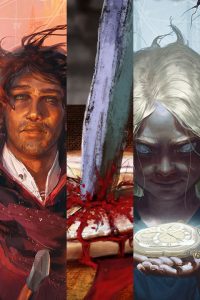 As you know at this point, we are in the midst of release week for
As you know at this point, we are in the midst of release week for 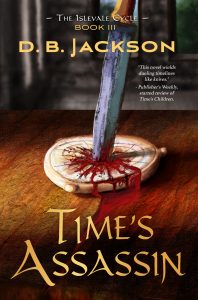 The truth is, I have felt that way about all three volumes of this trilogy. The Islevale books were incredibly difficult to write. I knew going in that writing time travel would be really hard — as one friend told me, “It’ll make your brain explode.” So much can go wrong. We have to examine every plot point from every possible angle to make certain it holds up to logic, and to the simple reality that time travel gives us endless opportunities for do-overs. Put another way, every event in a time travel story is negotiable. Each one can be altered or reversed by the very plot devices on which our stories depend.
The truth is, I have felt that way about all three volumes of this trilogy. The Islevale books were incredibly difficult to write. I knew going in that writing time travel would be really hard — as one friend told me, “It’ll make your brain explode.” So much can go wrong. We have to examine every plot point from every possible angle to make certain it holds up to logic, and to the simple reality that time travel gives us endless opportunities for do-overs. Put another way, every event in a time travel story is negotiable. Each one can be altered or reversed by the very plot devices on which our stories depend. I hoped that
I hoped that  I frequently tell beginning writers that they need to self-define success, something which is really hard to do in this business. All too often we writers are forced by the nature of publishing to seek exterior affirmation for our work — reviews, sales, awards if we’re fortunate enough to win them. These are the things the industry values and so, naturally, they are the things we care about as well. The problem with this is, the industry is cruel and capricious. We all know of good, even great, books that go unnoticed and unacknowledged. We all have seen mediocrity rewarded with terrific sales and undeserved attention. And we know that this is true in the world beyond publishing as well. Life is not always fair.
I frequently tell beginning writers that they need to self-define success, something which is really hard to do in this business. All too often we writers are forced by the nature of publishing to seek exterior affirmation for our work — reviews, sales, awards if we’re fortunate enough to win them. These are the things the industry values and so, naturally, they are the things we care about as well. The problem with this is, the industry is cruel and capricious. We all know of good, even great, books that go unnoticed and unacknowledged. We all have seen mediocrity rewarded with terrific sales and undeserved attention. And we know that this is true in the world beyond publishing as well. Life is not always fair. I’ve just finished working on a set of three novellas set in the
I’ve just finished working on a set of three novellas set in the 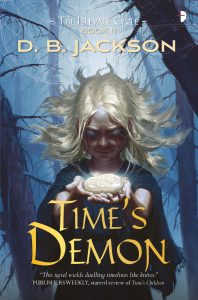 …And allow me take a moment to urge you get a copy of Time’s Assassin. (
…And allow me take a moment to urge you get a copy of Time’s Assassin. ( Last week’s Writing-Tip Wednesday post was about the
Last week’s Writing-Tip Wednesday post was about the  Another word oriented reference I have and love is English Through the Ages, which further refines the historical dating of words. It has an extensive index in the back that distinguishes among different meanings of words. Take the word “spleen”: The body part was named before the 1300s, but “spleen” was not used as a synonym for “temper” until the 1600s. I love tidbits like that.
Another word oriented reference I have and love is English Through the Ages, which further refines the historical dating of words. It has an extensive index in the back that distinguishes among different meanings of words. Take the word “spleen”: The body part was named before the 1300s, but “spleen” was not used as a synonym for “temper” until the 1600s. I love tidbits like that.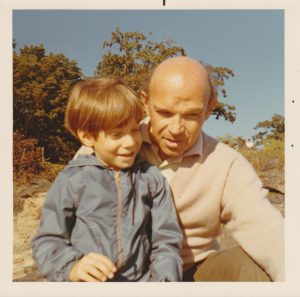 My father was born in 1919, lived through the Great Depression, lost a brother to World War II, married my mother half a year after V-E day (almost to the day). He supported Wendell Wilkie in the Presidential election of 1940 (although he would have been too young by a month to vote) and very nearly lost my mother when he confessed this to her before their wedding. Never again did he vote for a Republican for President.
My father was born in 1919, lived through the Great Depression, lost a brother to World War II, married my mother half a year after V-E day (almost to the day). He supported Wendell Wilkie in the Presidential election of 1940 (although he would have been too young by a month to vote) and very nearly lost my mother when he confessed this to her before their wedding. Never again did he vote for a Republican for President.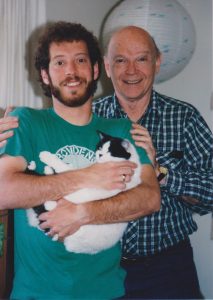 He was caring and generous, devoted to his family and friends. He loved a crass joke, but he took great pride in being gentlemanly – a product of his upbringing. My grandmother demanded no less of both her sons, just as my dad demanded no less of my brothers and me. I remember in high school he and I drove my girlfriend back to her home – I sat up front and she was in back. We pulled up to her house, and he turned around and said, “M____, you stay right there until he gets your door for you and walks you in.” Which, of course, I scrambled to do.
He was caring and generous, devoted to his family and friends. He loved a crass joke, but he took great pride in being gentlemanly – a product of his upbringing. My grandmother demanded no less of both her sons, just as my dad demanded no less of my brothers and me. I remember in high school he and I drove my girlfriend back to her home – I sat up front and she was in back. We pulled up to her house, and he turned around and said, “M____, you stay right there until he gets your door for you and walks you in.” Which, of course, I scrambled to do. This past Friday our little college town had a peaceful protest march followed by a rally on the college quad. It was a terrific event: somber, but also uplifting. Several people spoke, including my wife, who is provost of the university. Most of the speakers were Black; Nancy is not. And her message was directed at the many White allies who were in attendance. Showing up is great, she said. But it’s not enough. We who consider ourselves allies of those fighting for racial justice, but who also carry enormous privilege, have to challenge ourselves to act, to fight every day for a better world. And she, in turn, challenged us. Think of things you can do. Commit yourselves.
This past Friday our little college town had a peaceful protest march followed by a rally on the college quad. It was a terrific event: somber, but also uplifting. Several people spoke, including my wife, who is provost of the university. Most of the speakers were Black; Nancy is not. And her message was directed at the many White allies who were in attendance. Showing up is great, she said. But it’s not enough. We who consider ourselves allies of those fighting for racial justice, but who also carry enormous privilege, have to challenge ourselves to act, to fight every day for a better world. And she, in turn, challenged us. Think of things you can do. Commit yourselves.